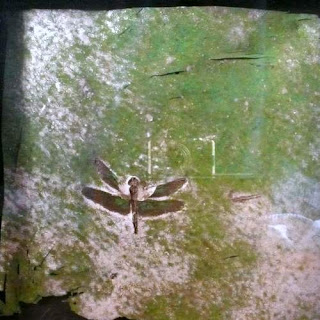 Dear Gentle Reader,
Dear Gentle Reader,Indulge me.
I am dangerous sometimes, like these frogs.
On a seemingly different topic, I thought that if we can talk in this blog about Dante Alighieri (c.1265-1321), Geoffrey Chaucer (c.1343-1400), and William Shakespeare (1564-1616) we can certainly talk of the Japanese poet 松尾芭蕉 (Matsuo Bashô) (1644-1694).
Look at these pictures.
You just know by looking at these frogs that they are poisonous, dangerous little amphibians.
(OK, for scientific accuracy, none of the South American poison dart frogs [two are pictured here] actually have secretions poisonous enough to use effectively on darts for bringing down large game. Apparently. But they look far more menacing than a picture of curare flowers.)
Nonetheless, just by reading here, sometimes, you know that I am dangerous.
I played around a bit with extemporaneous haiku this week.
I played around a bit with extemporaneous haiku this week.
I will do so again.
See? Dangerous.
Quod erat demonstrandum. (Ish.)
On a seemingly different topic, I thought that if we can talk in this blog about Dante Alighieri (c.1265-1321), Geoffrey Chaucer (c.1343-1400), and William Shakespeare (1564-1616) we can certainly talk of the Japanese poet 松尾芭蕉 (Matsuo Bashô) (1644-1694).
Especially if we talk about haiku.
To provide some Japanese historical context, Bashô lived in the beginning of the Edo period (1603-1868) in Japanese history. (Edo is the old name for what we now call Tokyo.)
In Japan, Bashô is regarded as Japan's greatest poet.
He started off life as a junior son of a low-ranking samurai living in a rural prefecture (we think). He ended up, however, in Edo, where your humble scribe once lived, and Bashô became the master of the poetry style that became known as haiku.
Many consider Matsuo Bashô's greatest haiku to be this one.
古池
蛙飛び込む
水の音
In anglicized transliteration, it reads as follows...
Furu ike ya
kawazu tobikomu
mizu no oto
Pretty amazing, no?
To provide some Japanese historical context, Bashô lived in the beginning of the Edo period (1603-1868) in Japanese history. (Edo is the old name for what we now call Tokyo.)
The Edo period was the final period of Japan's feudal age when the Tokugawa Shogunate installed itself, through success in battle, and ruled Japan as a unified whole, after a period of internecine battles between rival warlords (Daimyos).
(The Tokugawa clan comprised the last family of Shoguns [feudal, hereditary military dictators] prior to the Meiji Restoration which transformed Japan into a modern, industrial nation.)
In 1644, the year of Bashô's birth, the Chinese Ming dynasty had just ended, Cromwell was decisively winning the English Civil War and John Knox published the History of the Reformation of Religion within the realm of Scotland.
In 1694, the year of Bashô's death, Calcutta had been founded for four years already, the Bank of England was chartered, and the War of the League of Augsburg was just beyond its midway point.
So, during Matsuo Bashô's lifetime, Asia and the West were changing, but Japan was still very insular.
In 1644, the year of Bashô's birth, the Chinese Ming dynasty had just ended, Cromwell was decisively winning the English Civil War and John Knox published the History of the Reformation of Religion within the realm of Scotland.
In 1694, the year of Bashô's death, Calcutta had been founded for four years already, the Bank of England was chartered, and the War of the League of Augsburg was just beyond its midway point.
So, during Matsuo Bashô's lifetime, Asia and the West were changing, but Japan was still very insular.
Japanese values ruled supreme in Japan, just like the Shogun, at this time.
In this milieu, Matsuo Bashô started off life as a rural samurai, but ended up so much more.
Who was he?
In Japan, Bashô is regarded as Japan's greatest poet.
He started off life as a junior son of a low-ranking samurai living in a rural prefecture (we think). He ended up, however, in Edo, where your humble scribe once lived, and Bashô became the master of the poetry style that became known as haiku.
Everyone knows that Japanese aesthetics favour minimalism packed with subtle meanings.
Haiku's encapsulation of experiences in a minimalist poetry package is why the Japanese love(d) haiku and exalted Bashô.
Three phrases, seventeen syllables in total, are all that is permissible to capture and convey a mood, a time, a feeling, or an experience in haiku.
(I say three phrases because classically they were written in one vertical line, but in English they are written on three lines to signify the three phrases, usually with five syllables on the first line, seven on the second, and five, again, on the third line.)
Very Zen indeed, or very Zen in deed.
Many consider Matsuo Bashô's greatest haiku to be this one.
古池
蛙飛び込む
水の音
In anglicized transliteration, it reads as follows...
Furu ike ya
kawazu tobikomu
mizu no oto
...
Pretty amazing, no?
...
Unfortunately, it is really hard to translate things like this, well.
Especially if you are trying to maintain the metre and brevity of the original form.
...I will not even try...
But, I will send you to a good, and quick source that does try.
Here is a page that provides thirty-one English translations of this poem.
And this is another (to your humble scribe) interesting commentary on the power of the web.
Here is a page that provides thirty-one English translations of this poem.
And this is another (to your humble scribe) interesting commentary on the power of the web.
In translating this poem one of the challenges is translating the idea of 'the sound of water' and try to find an onomatopoeic word in English for the sound of something dropping into water.
Most translators on other web pages go with 'Plop'.
All of this highlights how some things can be found ludicrously easily via the web.
With a click I can find, and share, more versions of this poem than I have translated copies in my home in Hong Kong.
You get to, if you want, briefly look, and get a feel for the challenge of translating by visiting this site I am trying to send you to. (Go on. Click it. You want to know what the poem reads like, don't you?)
At what cost? Maybe one or two minutes of your time and the energy needed to click a link and move your eyes.
I know your humble scribe is behind the times (still using e-tablets and such for e-cuneiform), but I again recognized the power of the web while considering this post.
Anyone can publish, today. Even your humble scribe.
Sure, there are accuracy, precision, and interpretation issues in each individual case of auto-publishing on the web, but the law of large numbers means that the standard understanding will usually predominate while the freak factor means that obscure, dangerous, wonky, and whimsical ideas will get out there too.
It is dangerous, subversive, and wonky.
My submission to 3WW, a weekly haiku game challenging you to create a haiku including three set words, is inspired by South American tree frogs. (Hence, today's image at the top of the post.)
The idea of frogs, in turn, allowed me to bring into this post the haiku that some scholars consider the greatest Japanese haiku by the master of the art.
And that is the power of the web. Again, anyone can publish here. Even me and my stream of consciousness. See? I am dangerous. (This sort of thing just cannot be good for readership levels.)
The 3WW bento for this week consisted of Caress, Jagged, and Ruthless.
Here is my 3WW offering, entitled Plip!
Plip!
Ruthless frog toxin
drips on jagged arrow heads.
Touch once, caress death.
Tschuess,
Chris





















